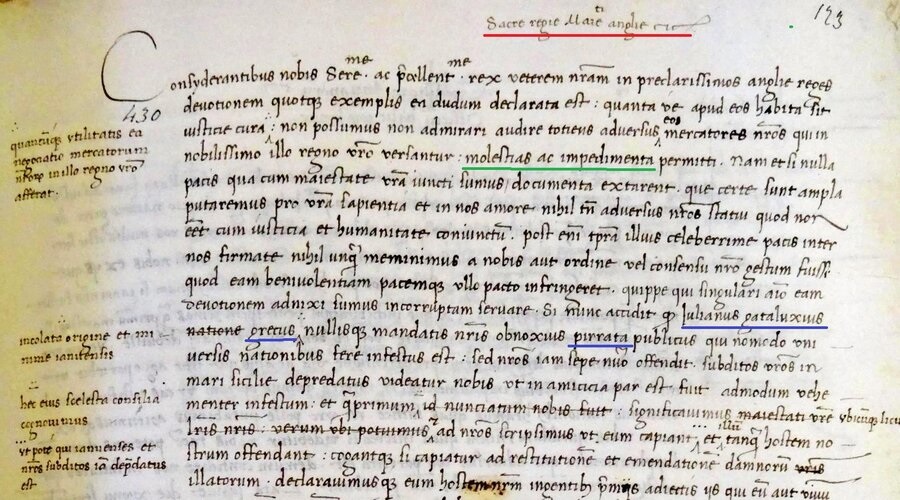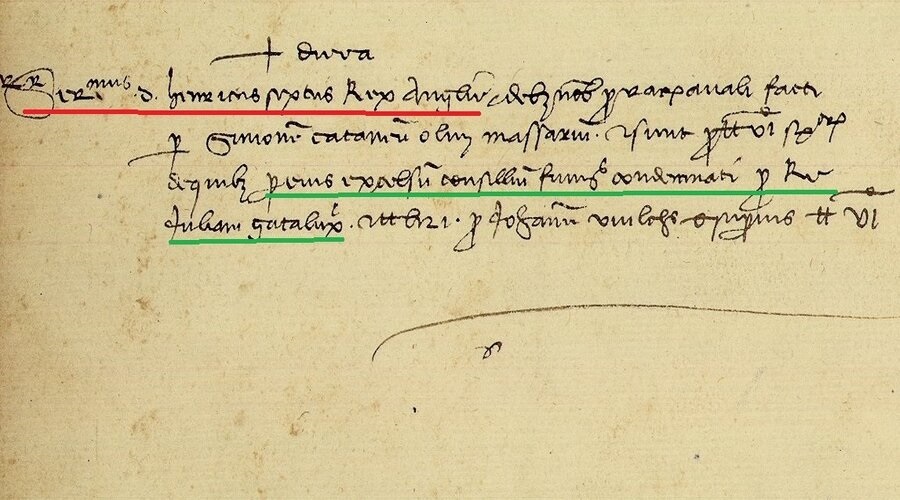PhD Top Stories
Giulia Calabrò
How in the fifteenth century an act of piracy triggered a commercial crisis between England and Genoa
Doctoral Programme in History of societies, institutions and thought. From medieval to contemporary history (in collaboration with Università degli Studi di Udine)
«[…] per eius excelsum consillium sumus condemnati pro re Iuliani Gataluxi», we are doomed by his excellent decision, because of the affair of Giuliano Gattilusio. Thus the hand of a Genoese merchant wrote in a book of accounts in London, in 1458. The “excellent” decision was made by the king, Henry VI, who had recently condemned the Genoese merchants in his kingdom to pay a large sum as compensation for the damages caused by the famous corsair Giuliano Gattilusio. In the fifteenth century England was far from being the naval and imperialist power present in the collective imagination: it was a country exhausted by the Hundred Years' War with France, which in 1455 fell into a civil war that would last thirty years. In such a scenario, the Italian merchants, supported by their technological and economic superiority, carved out an important role: from the 13th century, they sailed the Atlantic towards London and Southampton, and skillfully managed to weave a commercial network that joined the Mediterranean to Flanders, in which English merchants had the modest role of minor characters. The Venetians, the Florentines, the Lucchesi alongside the Genoese were the most numerous among the Italians in England, in the commercial squares across the Channel, arousing suspicion and hatred among the native colleagues, who despised the «marchaunds straungers Italyans».
In the fifteenth century the English tried to break free from the Italian commercial mediation: after a first failure in 1446, in 1457 the merchant Robert Sturmy left the port of Bristol on board the "Katharine", driving an English commercial expedition bound for the eastern Mediterranean. While returning from the east, it was intercepted, attacked and plundered by the pirate Giuliano Gattilusio. 128 men died in the attack, including Sturmy. When it became known in England, local merchants reacted violently: many of them, less and less willing to bear the Italian competition, had invested large sums on Sturmy’s expedition. They clamored to be compensated to Henry VI, whose position was extremely difficult: surrounded by Yorkist enemies, he couldn’t afford to lose the economic support of the merchants and subjects of his. Who, then, should be asked for compensation? Gattilusio was born in Lesbos to the lords of Mitilene, but the family was of Genoese origin; moreover, the corsair had often frequented the Ligurian harbour. Based on these elements, although Genoa reiterated that Gattilusio was of Greek origin, Henry VI decided that Genoa should pay, by means of its merchants in England.
By order of the king, houses and warehouses of the Genoese were searched, the goods contained therein seized and their owners locked up in the prison of Fleet. The compensation was set at 6000 pounds. To raise such a high amount the Genoese got heavily into debt: among the creditors there were their colleagues in Bruges and notables of the English court (including Geoffrey Boleyn, Anne Boleyn’s great-grandfather), who provided money at -often- penalising interest rates for Italian merchants. It took 12 years for the creditors to be repaid and the dispute to be concluded. But with what consequences? England was an important commercial hub for Genoa, but was the Atlantic a way still worth following, despite the bumps in the road? After 1458, however, the Genoese presence across the Channel changed: the community and the traffics decreased and the historical search purpose is to tell how, how much and with what times.

Figure 1: Draft of a letter of September 1458 sent from Genoa to Henry VI; the Genoese merchants in England are subjected to «molestias ac impedimenta», because of the act of the «pirrata» Gattilusio, who is said to be Greek, not Genoese.
Genoese (Fig.1) and English sources guide this investigation, because it is essential to compare what is preserved by both actors in this scene. Through the reading and study of the thousands of documents preserved in the archives, it is possible to discover sources which are useful to retrace the evolution of the crisis. And if the Liber Partimentorum, book of accounts of the Genoese merchants in London (fig.2), gives us the list of their creditors and debtors in those difficult years, on the other hand, the British documents, kept in the National Archives, let us trace the orders of imprisonment, seizure and records of the arrivals of Genoese ships in English ports.

Figure 2: Extract of the Liber Partimentorum; the lot presented is entitled to Henry VI, «rex Anglie» (in red); subtitled in green there is the quote about the conviction of Genoese merchants.
Finally, it will be possible to set the Anglo-Genoese crisis in the wider economic policy implemented by Genoa at the end of the Middle Ages, well aware that the xenophobic attitudes widespread among the English in the XV century are not that much different from those that had encouraged Brexit in 2016.
Authors and affiliations
Giulia Calabrò1Contact
Giulia Calabrò, email: giulia.calabro@phd.unitsReference
Giulia CalabròI mercanti della Superba in terra inglese: introduzione alla crisi del 1458
VI Ciclo di studi medievali (Firenze,8-9 giugno 2020) 12, NUME (a cura di), EBS Print, Lesmo (MB) 2020, pp. 217-222
https://www.academia.edu/43390419/I_mercanti_della_Superba_in_terra_inglese_introduzione_alla_crisi_del_1458
Informazioni aggiornate al: 03.8.2020 alle ore 12:49
Contact: Webmaster - Università di Trieste pagina curata da: Research Doctorate

Piazzale Europa, 1 - 34127 - Trieste, Italia -
Tel. +39 040 558 7111 - P.IVA 00211830328
C.F. 80013890324 - P.E.C. ateneo@pec.units.it



